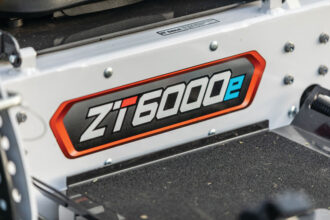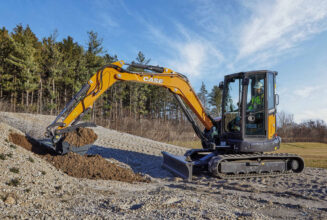Kohler to offer first flex-fuel EFI engines
Kohler recently announced plans to not only introduce the industry’s first flex-fuel electronic fuel injection (EFI) engine, but also to make this fuel-efficient, cleaner-burning technology standard — not an option — on all Kohler Command Pro and Aegis twin-cylinder engines.
In March 2009, Kohler will make the Command Pro 30 gasoline, twin-cylinder model the first flex-fuel EFI engine and convert all of its Command Pro air-cooled and Aegis liquid-cooled engines to this technology — at a competitive price with traditional carbureted engines — over the next two years.
Kohler partnered with Delphi, a leading global supplier of mobile electronics and transportation systems — to design this new flex-fuel EFI system with patent-pending technology that will offer significant fuel savings, improved performance and reduced emissions.
Kohler flex-fuel EFI models will be available on 26 twin-cylinder models ranging from 19 to 41 hp. and will operate efficiently and without excessive wear when E-85 or any other alternative fuel is used. An additional benefit of the new Kohler flex-fuel EFI engines is instant load response. The Kohler exclusive EFI system allows the engine to respond with peak Kohler performance even in changing altitudes and load requirements, which in turn, operates at top efficiency.
Kohler also designed this new line of engines within the same footprint as its current Command Pro and Aegis models, so that OEMs can easily drop in the newest Kohler engine without altering the end equipment design to accommodate the engine.
This is accommodated by Kohler’s exclusive self-contained EFI design, which features only one fuel line rather than an additional return fuel line with a special harness. The fuel module, electronic control unit and sensors are also engine mounted.
“Kohler introduces this new technology not only at a time when fuel prices are hitting all-time highs, but there’s also been a movement of diesel-powered users looking more carefully at spark-ignited engines and what they can now bring to the table,” said Rick Koehl, director of marketing and quality, Kohler Engines. “Depending on the application, end users can realize a 17- to 28-percent fuel-efficiency savings. And, Kohler will be within the EPA Phase 3/CARB Tier 3 levels immediately, with extremely low levels of HC and NOx being produced. If the engines run on E-85, those emissions levels are reduced even further compared to operating with gasoline.”
Also true to Kohler Engines, the “closed-loop” system will continue to be a standard feature on these new engines. In most EFI engines, when they are started, they operate in an “open loop” mode mapped by the electronic control unit (ECU). Only Kohler EFI engines include an oxygen sensor that analyzes the air/fuel mixture in the exhaust. If the oxygen level strays from the ideal air/fuel mixture, the sensor triggers adjustments in the ECU map to adjust the amount of fuel injected into the system. Only Kohler EFI engines then “close the loop” between the air/fuel intake and the exhaust output to provide a constant stream of critical feedback — and optimal power and fuel economy. The closed loop advantage also means that only Kohler EFI engines automatically adapt to air cleaner conditions and altitude changes.




